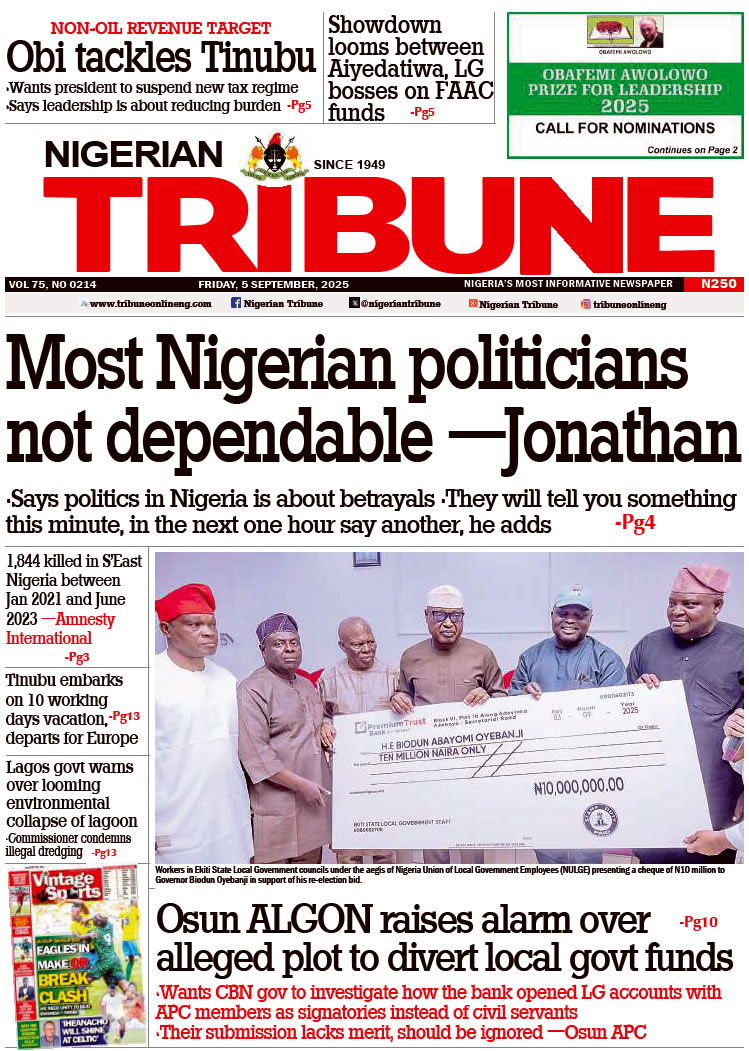ON February 3, the Independent National Electoral Commission (INEC) conducted legislative by-elections and re-run elections in 26 states across the country. There were by-elections in nine states for two senators, four members of the House of Representatives and three members of state Houses of Assembly to replace members who passed away or resigned their membership of the assemblies. In other states, re-run elections took place at designated constituencies and polling units as ordered by-election tribunals. The elections were to fill vacancies in three senatorial districts, 17 federal and 28 state constituencies spread across 80 local government areas. There were 575 registration areas/wards and 8,934 polling units, involving 4,904,627 registered voters, with 4,613,291 permanent voter cards collected were accredited for use.
Sadly, although the elections were peaceful and witnessed impressive voter turnout in some states, the exercise was marred by allegations of missing election materials, invasion by thugs, attacks on electoral officers and pre-filled election result sheets in most states. The elections were also characterised by votebuying and ballot snatching, disruption and low turnout of voters in several places. To illustrate, the late commencement of voting and hijacking of election materials by hoodlums marred the exercise in Akwa-Ibom State. The polls were held in 33 polling units in Ini/Ikono Federal Constituency and 20 polling units in Ibiono Ibom State Constituency. In Ebonyi, APC and PDP disagreed over the credibility of the exercise. While the PDP alleged massive votebuying and ballot-snatching occurred during exercise in the Ebonyi South by-election, APC described the process as free and fair. Attacks by bandits and croplooting overshadowed balloting in Katsina Sta+te. Even in Yobe State where there were just two senatorial districts, and in Lagos with just one, the exercise left much to be desired.
These irregularities forced INEC to suspend elections in Kano, Enugu, Akwa Ibom and Plateau states. Indeed, security agencies arrested many thugs who tried to disrupt polling in Plateau, Kano and several other states. Thus, most of the lapses that characterised the general elections in the past were evident during the February 3 polls. Security agencies, INEC and politicians failed the country once again. The exercise was mostly a sham, as the elections looked predetermined. The entire process appeared compromised: the rules were freely disobeyed. The desperation was evidently high.
It is disconcerting that almost one year after the experience of the 2023 shambolic general elections for which INEC and Nigeria received very unflattering assessment by international and domestic observers, it is not able to use the off-season elections to show that lessons have been learnt. It is regrettable that these re-run elections in many parts of the country still turned out to be generally lacking in credibility. The organisation was haphazard. It is bewildering that there was an influx of predetermined and already filled result sheets. The elections were conducted in a manner that suggests that it is impossible for INEC to conduct credible elections. The elections have shown that INEC, as presently constituted, may not be able to conduct fair and credible elections that would effectively reflect the decisions of voters.
It is a shame that such off-season elections involving few number of constituencies and voters proved difficult for INEC. If INEC fails to acquit itself creditably in such few elections, what hope does it hold for the 2027 general election and the gubernatorial elections to be held this year? That these rerun and by-elections were still largely defined and characterised by complaints and inefficiencies calls for critical electoral and election management reforms. Recognising that the governance of elections is not the preserve of INEC alone, we call on politicians, political parties and the security agencies to join hands with INEC to deal with the issues associated with flawed elections. Flawed elections mean great trouble for democracy and the democratic progress. They put great uncertainty on the guarantee of peaceful change of government. This is because they erode the legitimacy of the government and undermine confidence in the workings of democratic institutions. It is impossible to have real democracy outside of credible elections which seem to be almost out of reach now in the Nigeria.
Nigerians would have to ask themselves very hard questions about the nature and conduct of elections if they are truly interested in democracy and democratic rule. This is particularly so in a context in which the country is gripped by severe fiscal crisis amidst the impoverishment of the majority of its citizens. The struggle to survive by ordinary citizens has become so hard that they could become so desperate to accept any alternative that beckons regardless of the source. The clock is ticking.
WATCH TOP VIDEOS FROM NIGERIAN TRIBUNE TV
- Let’s Talk About SELF-AWARENESS
- Is Your Confidence Mistaken for Pride? Let’s talk about it
- Is Etiquette About Perfection…Or Just Not Being Rude?
- Top Psychologist Reveal 3 Signs You’re Struggling With Imposter Syndrome
- Do You Pick Up Work-Related Calls at Midnight or Never? Let’s Talk About Boundaries






